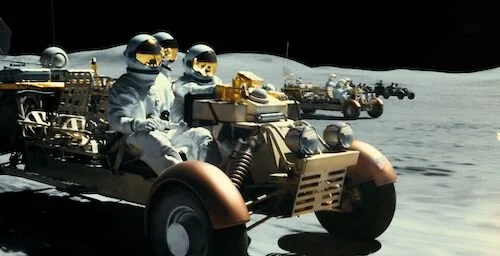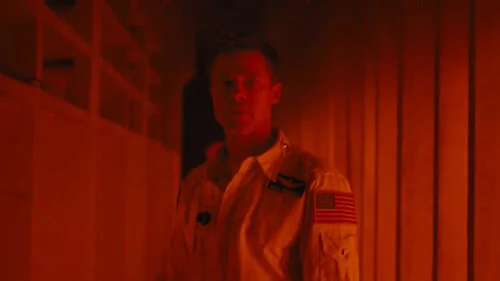Ad Astra
I’ve never really been the biggest fan of James Gray’s works. I’ve wanted to be, but his films and I have never clicked. For instance, The Immigrant was a highly touching period piece that doubled as an acting masterclass, and yet I still felt as though time dragged on (in the bad way: some films are extremely slow, yet you feel blessed to be stuck in these cinematic snow globes). I feel this same sense of sloth-ness in all of his works that I’ve seen. I’ll go as far as to say that Ad Astra is likely the best Gray film I’ve seen thus far, but even still, there are occasional moments that linger maybe just a little too long. They don’t grow stale, but the expiration date is looming. That’s a marginal flaw in a film of this magnitude, because you never want any part of your magnificent trek across the solar system to feel like a chore in any way.
For the most part, Ad Astra is actually quite a ride. There are key components that keep you locked in your seat, despite the few head scratching narrative choices. First and foremost, Brad Pitt delivers one of the strongest performances of his career, even in the decade he grew the most in. As a conflicted astronaut on route to finding his father, Pitt makes this leading role stern with his mission, but never neglectful of why he’s on said mission. There’s zero charm here, and that renders this space navigator human. It’s the kind of pulse a freezing film of this nature requires, and Pitt nails it.
A team traversing across the Moon.
The second largest highlight is Max Richter’s score, which has made a very strong case for itself when it comes to the score-of-the-year discussion. Absolutely every single number is the kind of minimalist track that can send all of your hairs standing at attention. Even in the more peculiar moments of Ad Astra, all feels emotionally resonant enough for you to be even kind of on the same page. It’s the kind of score that turns images frozen in time into a massive experience. On that note, the special effects are also outstanding, with the focuses-on-scientific-accuracy accenting each shot, rather than hindering them. The zero gravity floating, the majestic space crafts, and even the planets themselves, are all believable.
These illusions help drive the film, especially because of the one major problem I had: the glimpses of something more that are never acted upon. Between the brief instances of action (for reasons I won’t spoil), or even that shocking scene (with the least expected space passenger of the year), you have portals to endless possibilities presented to you. In a film like Solaris (the Andrei Tarkovsky one, not the remake), this level of mystery feels more like a reward. It’s an artistic and philosophical piece that thrives with its surprises. Each instance is a treat. In Ad Astra, we get one off cases that come and go. Nothing truly sticks, as if it were meant to be a part of this narrative universe. Why don’t we ever really revisit any of these parts? With a film that’s meant to feel scientifically accurate, with all of its cards on the table, this feels more like unfinished business than a mystery. You can’t just have that surprise guest without truly following up on it in any greater way. You just can’t.
Ad Astra is a great showcase of a performance that isn’t typical for Brad Pitt, and it’s worth the price of admission alone.
Nevertheless, Ad Astra is at least a deeply moving film that is worth investing in. Ignoring the brief appearances by great performers (especially Ruth Negga as a Mars base executive), the vignette-feel of the film and other flaws, will help make Ad Astra less of a tangled web. Focusing on the main mission, and the film’s key elements, will ensure that you will take part in a tear inducing sci-fi journey. If the film was sandpapered to feel more uniform, and even had another half another tacked on (so we can enjoy the side performances, narrative checkpoints, and more elements), Ad Astra could have been the 2019 space Apocalypse Now: the mission to save a veteran gone rogue, and all of those tagalongs that got affected along the way. As it is now, Ad Astra is still strong enough to not be entirely bogged down by its imperfections.
Andreas Babiolakis has a Masters degree in Film and Photography Preservation and Collections management from Ryerson University, as well as a Bachelors degree in Cinema Studies from York University. His favourite times of year are the Criterion Collection flash sales and the annual Toronto International Film Festival.






